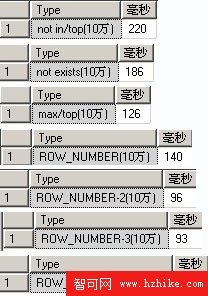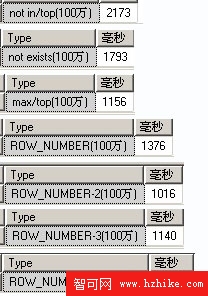分頁很重要,面試會遇到。不妨再回顧總結一下。
1.創建測試環境,(插入100萬條數據大概耗時5分鐘)。
create database DBTest use DBTest --創建測試表
create table pagetest ( id int identity(1,1) not null, col01 int null, col02 nvarchar(50) null, col03 datetime null ) --1萬記錄集
declare @i int set @i=0 while(@i<10000) begin insert into pagetest select cast(floor(rand()*10000) as int),left(newid(),10),getdate() set @i=@i+1 end
2.幾種典型的分頁sql,下面例子是每頁50條,198*50=9900,取第199頁數據。
--寫法1,not in/top
select top 50 * from pagetest where id not in (select top 9900 id from pagetest order by id) order by id --寫法2,not exists
select top 50 * from pagetest where not exists (select 1 from (select top 9900 id from pagetest order by id)a where a.id=pagetest.id) order by id --寫法3,max/top
select top 50 * from pagetest where id>(select max(id) from (select top 9900 id from pagetest order by id)a) order by id --寫法4,row_number()
select top 50 * from (select row_number()over(order by id)rownumber,* from pagetest)a where rownumber>9900 select * from (select row_number()over(order by id)rownumber,* from pagetest)a where rownumber>9900 and rownumber<9951 select * from (select row_number()over(order by id)rownumber,* from pagetest)a where rownumber between 9901 and 9950 --寫法5,在csdn上一帖子看到的,row_number() 變體,不基於已有字段產生記錄序號,先按條件篩選以及排好序,再在結果集上給一常量列用於產生記錄序號
select * from ( select row_number()over(order by tempColumn)rownumber,* from (select top 9950 tempColumn=0,* from pagetest where 1=1 order by id)a )b where rownumber>9900
3.分別在1萬,10萬(取1990頁),100(取19900頁)記錄集下測試。
測試sql:
declare @begin_date datetime declare @end_date datetime select @begin_date = getdate() <.....YOUR CODE.....> select @end_date = getdate() select datediff(ms,@begin_date,@end_date) as '毫秒'
1萬:基本感覺不到差異。
10萬:

100萬:

4.結論:
1.max/top,ROW_NUMBER()都是比較不錯的分頁方法。相比ROW_NUMBER()只支持sql2005及以上版本,max/top有更好的可移植性,能同時適用於sql2000,Access。
2.not exists感覺是要比not in效率高一點點。
3.ROW_NUMBER()的3種不同寫法效率看起來差不多。
4.ROW_NUMBER() 的變體基於我這個測試效率實在不好。原帖在這裡 http://topic.csdn.Net/u/20100617/04/80d1bd99-2e1c-4083-ad87-72bf706cb536.Html
PS.上面的分頁排序都是基於自增字段id。測試環境還提供了int,nvarchar,datetime類型字段,也可以試試。不過對於非主鍵沒索引的大數據量排序效率應該是很不理想的。
5.簡單將ROWNUMBER,max/top的方式封裝到存儲過程。
ROWNUMBER():
create proc [dbo].[spSqlPageByRownumber] @tbName varchar(255), --表名
@tbFIElds varchar(1000), --返回字段
@PageSize int, --頁尺寸
@PageIndex int, --頁碼
@strWhere varchar(1000), --查詢條件
@StrOrder varchar(255), --排序條件
@Total int output --返回總記錄數
as declare @strSql varchar(5000) --主語句
declare @strSqlCount nvarchar(500)--查詢記錄總數主語句
--------------總記錄數---------------
if @strWhere !='' begin set @strSqlCount='Select @TotalCout=count(*) from ' + @tbName + ' where '+ @strWhere end else begin set @strSqlCount='Select @TotalCout=count(*) from ' + @tbName end --------------分頁------------
if @PageIndex <= 0 begin set @PageIndex = 1 end set @strSql='Select * from (Select row_number() over('+@strOrder+') rowId,'+ @tbFIElds +' from ' + @tbName + ' where 1=1 ' + @strWhere+' ) tb where tb.rowId >'+str((@PageIndex-1)*@PageSize) +' and tb.rowId <= ' +str(@PageIndex*@PageSize) exec sp_executesql @strSqlCount,N'@TotalCout int output',@Total output exec(@strSql)
Max/top:(簡單寫了下,需要滿足主鍵字段名稱就是"id")
create proc [dbo].[spSqlPageByMaxTop] @tbName varchar(255), --表名
@tbFIElds varchar(1000), --返回字段
@PageSize int, --頁尺寸
@PageIndex int, --頁碼
@strWhere varchar(1000), --查詢條件
@StrOrder varchar(255), --排序條件
@Total int output --返回總記錄數
as declare @strSql varchar(5000) --主語句
declare @strSqlCount nvarchar(500)--查詢記錄總數主語句
--------------總記錄數---------------
if @strWhere !='' begin set @strSqlCount='Select @TotalCout=count(*) from ' + @tbName + ' where '+ @strWhere end else begin set @strSqlCount='Select @TotalCout=count(*) from ' + @tbName end --------------分頁------------
if @PageIndex <= 0 begin set @PageIndex = 1 end set @strSql='select top '+str(@PageSize)+' * from ' + @tbName + '
where id>(select max(id) from (select top '+str((@PageIndex-1)*@PageSize)+' id from ' + @tbName + ''+@strOrder+')a)
'+@strOrder+'' exec sp_executesql @strSqlCount,N'@TotalCout int output',@Total output exec(@strSql)
園子裡搜到Max/top這麼一個版本,看起來很強大,http://www.cnblogs.com/hertcloud/archive/2005/12/21/301327.Html
調用:
declare @count int --exec [dbo].[spSqlPageByRownumber]'pagetest','*',50,20,'','order by id asc',@count output
exec [dbo].[spSqlPageByMaxTop]'pagetest','*',50,20,'','order by id asc',@count output select @count